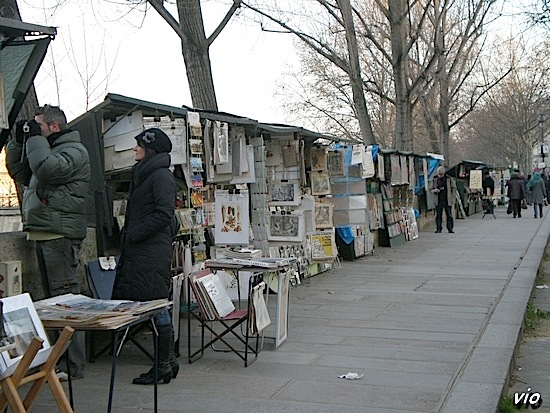Avec 900 «boîtes» et 300 000 livres, les 240 bouquinistes des quais de la Seine sont… la plus grande librairie du monde à ciel ouvert. Sagement alignés sur les quais de Seine (la profession est très réglementée), ces « marchands d’esprit », comme on les appelle encore, font partie du décor parisien. Les voilà, même, patrimoine mondial de l’UNESCO. Chacun dispose de 10 mètres de parapet et doit être ouvert du lever au coucher du soleil au moins quatre jours par semaine.
Pas très drôle quand il pleut, neige ou vente ! La tradition de ces bouquinistes débute aux alentours du XVIe siècle avec des colporteurs. Sous la pression des libraires, un règlement de 1649 leur interdit l’étalage de livres sur le Pont Neuf. Il faut dire que les bouquinistes de l’époque étaient surtout des voyageurs marginaux diffusant de féroces critiques sur le roi, ses ministres, le clergé ou la police. Par la suite, selon les périodes et l’humeur royale, ces marchands à la sauvette sont chassés puis réintégrés sous agréments, puis chassés à nouveau, etc…
S’étant imposés au fil des siècles, les nouveaux bouquinistes participent, aujourd’hui, du charme des bords de Seine. Ils constituent tout autant un patrimoine littéraire qu’un but de promenade dans un des environnements architecturaux les plus beaux au monde. Si vous alliez y déambuler, vous trouverez, outre les centaines de milliers ouvrages, anciens ou contemporains, de belles éditions épuisées, estampes, gravures, revues, timbres et cartes postales de collection. Rendez-vous donc, sur la rive droite, du pont Marie au quai du Louvre et sur la rive gauche, du quai de la Tournelle au quai Voltaire. Tout cela hume le parisianisme de bon goût? Peut-être. Mais, pas seulement. Tokyo, Montréal, Québec, Ottawa, Pékin et bien d’autres grandes capitales se sont inspirées du modèle des bouquinistes parisiens.
Et puis, pour terminer, sachez que le mot « bouquiniste » vient du flamand boeckjîn qui signifie « petit livre » ! Pourquoi cette curieuse origine ? Une affaire de bateliers hollandais remontant la Seine, peut-être..
Bookstalls along the Seine
With 900 « boxes » and 300,000 books, the 240 bouquinistes (second-hand booksellers) on the banks of the Seine constitute the biggest open-air book shop in the world.
Quietly lined up along the banks of the Seine (the profession is highly regulated), these « merchants of the mind » as they are still known, are part of the Parisian scenery. Today, they are even a listed UNESCO World Heritage Site. Each one is entitled to 10 metres of parapet and must be open from sunrise to sunset at least four days per week.
Not much fun when it is raining, snowing or windy! The tradition of the bouquinistes began around the 16th century with the arrival of pedlars. Under pressure from book shops, in 1649 a regulation was introduced forbidding the display of books on the Pont Neuf. It should be pointed out that the bouquinistes at that time were mainly dissident travellers spreading fierce criticism of the king, his ministers, the clergy and the police. Thereafter, depending on the period in time and the royal mood, these illegal tradesmen were removed, given consent to return, then driven away again, and so on.
Having established themselves over the centuries, the current-day bouquinistes are today part of the charm of the banks of the Seine. They represent just as much a literary heritage as a reason for a wander surrounded by some of the most beautiful architecture in the world. If you go for a stroll there, aside the hundreds of thousands of old and contemporary works, you’ll find some superb, out-of-print publications, prints, photographs, magazines, stamps and postcards for collectors. So see you on the Right Bank, from the Pont Marie to the Quai du Louvre and on the Left Bank, from the Quai de la Tournelle to the Quai Voltaire. Does this all have an air of Parisian good taste? Perhaps. But, not only here. Tokyo, Montreal, Quebec, Ottawa, Beijing and many other great cities have taken inspiration from the Parisian bouquinistes.And finally, let it be known that the word « bouquiniste » comes from the Flemish « boeckjîn » which means « little book »! But why this strange origin? Something to do with Dutch boatmen sailing up the Seine perhaps.
Didier MOINEL DELALANDE










